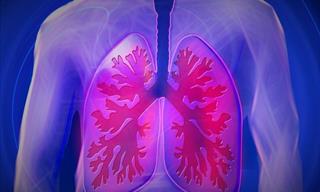1. Licorice Tea (Glycyrrhiza glabra)
Licorice tea is made of dried and ground up licorice root, a powerful herbal remedy that's known to promote cardiovascular health, offer pain relief, and has been used to diminish asthma symptoms for centuries. The sweet and aromatic root naturally contains a compound called glycyrrhizin, which has been shown in animal model studies and human research to improve symptoms of asthma and potentiate conventional asthma treatments.
How to make licorice tea:
Bring 8 oz (240 ml) water to a boil, and then add 2 teaspoons of dried licorice root, chopped up into small pieces. Remove from the heat, cover with a lid, and let the tea steep for 5 minutes. Strain and enjoy warm or cold.
Avoid drinking more than 1 cup (240 ml) of licorice root a day, as excessive daily consumption may increase your blood pressure and have other adverse side effects. If you have cardiovascular issues or other pre-existing conditions, ask a health professional if licorice tea is safe for you.
2. Green and Black Tea (Camellia sinensis)
Both black and green tea come from the same plant, and both are rich in caffeine, antioxidants, and other plant compounds known to improve breathing and clear out the airways, as well as lower your risk of numerous diseases and aid weight loss.
More specifically, the antioxidants present in green tea may address the cause of asthma and other respiratory conditions - inflammation, whereas caffeine provides temporary relief, as it is capable of relaxing the airways for up to 4 hours after absorption. Additionally, one large Korean study also found that drinking 2 cups of green tea a day made participants have a much better lung function in general compared to those who didn't drink tea.
How to prepare black and green tea will depend on the brand and variety of tea, so it's best to consult the instructions printed on the packaging of the tea you have at home.
3. Mullein Tea (Verbasscum thapus)
Another herb known for its remarkable respiratory health benefits is the common mullein, the leaves of which are dried and used to prepare a yellow-colored tea with a refreshing and subtly sweet taste. This tea has been used in traditional medicine specifically as a remedy for respiratory issues ranging from a wet cough to bronchitis and asthma.
Studies support the use of mullein for respiratory issues and asthma, suggesting it may help symptoms like coughing and wheezing. The herbal tea may also reduce inflammation and relax the muscles in your respiratory system, which can help with the feeling of tightness in the chest and shortness of breath.
How to prepare mullein tea:
Add in 1 teaspoon of dried mullein leaves into 1 cup (240 ml) of boiling water. Then, steep the tea for 15-30 minutes, subsequently straining out the leaves and drinking as is.
4. Ginger Tea (Zingiber officinale)
It seems that there are very few health concerns Ginger Tea can't help with, which isn't surprising given that ginger root is such a powerful anti-inflammatory substance. The antioxidants present in ginger, such as gingerols and shogaols, reduce the inflammation in the airways, which may ultimately alleviate respiratory symptoms, breathing distress, and asthma symptoms.
One study even reported that asthma patients who took 450 mg of ginger extract every day noticed 20% less wheezing and 52% less chest tightness compared to the placebo group after 2 months of taking ginger.
How to make ginger tea:
Finely grate a one-inch (2.5 cm) piece of peeled ginger and add to 1 cup (240 ml) of boiling water. Depending on how spicy you like your ginger tea, steep the tea from 10-20 minutes, then strain and enjoy as is or with some lemon and honey.
5. Eucalyptus Tea (Eucalyptus globulus)
The last, but certainly not the least item on our list is eucalyptus tea, which is made from dried eucalyptus leaves. Make sure NOT to prepare this tea with eucalyptus essential oil instead of dried leaves, as the essential oil is highly concentrated and toxic when ingested, whereas the leaves of the plant are safe to brew into a tea.
Studies have confirmed that an ingredient called eucalyptol naturally present in the leaves of the plant is capable of decreasing inflammation, expanding the airways in your lungs, and reducing mucus production. One article even reported that taking 600 mg of eucalyptol every day reduced asthma patients' need in medication by 29% compared to placebo.
How to make eucalyptus tea:
Steep 1.5 teaspoons of dried eucalyptus leaves in 1 cup (240 ml) of boiling water for 10 minutes. Strain the leaves before drinking and enjoy cold or warm.
Please share this article with those who might find it useful
 Go to BabaMail
Go to BabaMail
























































